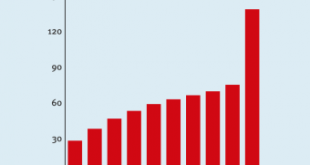Development economists have been using randomized controlled trials (RCTs) for the best part of two decades, and economists working on welfare policies in the US have been doing so for much longer. The years of experience have made the discussions richer and more nuanced, and both proponents and critics have learned from one another, at least to an extent. In this essay, I do not attempt to reconstruct the full range of questions that I have written about elsewhere. Instead, I...
Read More »Why we need Big Theories
Why we need Big Theories [embedded content]
Read More »Nights in white satin
Nights in white satin [embedded content] Moody Blues classic that still — after more than 50 years — gives me goose pimples every time I listen to it.
Read More »Statsskulden är vårt minsta problem nu
Statsskulden är vårt minsta problem nu Den största risken är att vi precis som 2008 underskattar nedgången … Men Magdalena Andersson verkar fast i sin metafor att hon sparat duktigt och därför kan vi använda lite av det hon ”sparat i ladan”. Men metaforen är fel, för en regering måste skydda sin befolkning även när ”ladan är tom”. I stora kriser som krig och pandemier ställs de vanliga reglerna på ända. Precis allt måste göras för att besegra viruset och...
Read More »How money is created
How money is created Everything we know is not just wrong – it’s backwards. When banks make loans, they create money. This is because money is really just an IOU. The role of the central bank is to preside over a legal order that effectively grants banks the exclusive right to create IOUs of a certain kind, ones that the government will recognise as legal tender by its willingness to accept them in payment of taxes. There’s really no limit on how much...
Read More »Blott en dag
[embedded content]
Read More »Ain’t no sunshine when she’s gone
Ain’t no sunshine when she’s gone [embedded content] Acclaimed soul singer behind hit Ain’t No Sunshine, Bill Withers, has died from heart complications aged 81. RIP.
Read More »Politiska reformer bakom ökade ojämlikheten
Politiska reformer bakom ökade ojämlikheten Både den rikaste och den fattigaste tiondelen av befolkningen sticker ut i statistiken, men det finns även skillnader inom dessa grupper. Under 70-talet minskade de rikaste 10 procentens andel av inkomsterna från omkring en fjärdedel till en femtedel, men har sedan 1980 knaprat sig tillbaka. Den rikaste procentens andel har däremot nästan fördubblats till cirka 7 procent av landets samlade inkomster. Det mesta av...
Read More »Cauchy logic and economics
Cauchy logic and economics [embedded content] Yours truly has no problem with solving problems in mathematics by ‘defining’ them away. But how about the real world? Maybe that ought to be a question to ponder even for economists all to fond of uncritically following the mathematical way when applying their mathematical models to the real world, where indeed “you can never have infinitely many heaps” … In econometrics we often run into the ‘Cauchy logic’ —...
Read More »Coronakrisen — ett postkeynesianskt perspektiv
Det har uppstått ett brett politiskt stöd under coronakrisen för finanspolitiska stimulanser i de enskilda EU-länderna (och i Storbritannien). EU har åtminstone tillfälligt släppt sina stränga krav på offentlig budgetbalans och de nationella regeringarna har tvingats att göra avkall på sina egna finanspolitiska regler. Den expansiva finanspolitiken på ländernivå för att rädda jobb och företag har få restriktioner. Långräntorna är låga och kommer förmodligen att sjunka...
Read More » Lars P. Syll
Lars P. Syll





